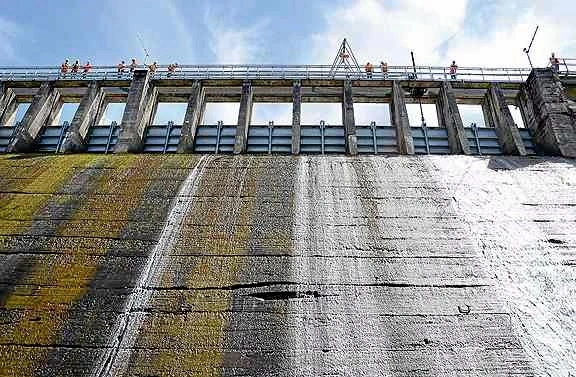
Company won’t re-examine license terms for endangered species in the interim
Sonia Waraich, Times Standard 7/13/2022
Pacific Gas & Electric does not believe it’s necessary to reexamine its license terms for endangered species at the Potter Valley Project as it prepares to decommission the dams, according to a letter the utility submitted to federal regulators.
PG&E submitted letters to the Federal Energy Regulatory Commission on Friday stating that it would take about 30 months to submit an application to surrender its license once its plan and schedule for doing so receives approval from the federal agency. On Tuesday, PG&E sent another letter stating that the letter sent by the National Marine Fisheries Service stating the terms for endangered fish species should be reevaluated in the interim contained “legal and factual inaccuracies” though it was willing to revisit some terms “so long as any revisions reflect the same level of effort and funding as is currently required.”
“To the extent NMFS intended there to be some reevaluation or assessment after twenty years, it could have said so in the (Biological Opinion),” the letter states. “In fact, the BiOp does require periodic adaptive management reviews. For example, NMFS required a review of the summer flow component of the (reasonable and prudent alternative) after 10 years of monitoring. Similarly, the interactions of the pikeminnow population and salmonids were required to be reassessed after 5 years. Those reviews occurred, and no changes were determined to be necessary.”
Fish conservation groups like California Trout and Trout Unlimited, however, disagreed and issued a statement criticizing the company’s “refusal to protect listed salmon and steelhead in the Eel River.”
“PG&E has made it clear they will rid themselves of the 100-year-old Eel River dams, but they seem content to slow-walk the process and continue to kill (Endangered Species Act)-listed fish while they take their sweet time,” Matt Clifford, California water attorney with Trout Unlimited, said in a statement. “Yesterday’s filing officially puts PG&E on the path toward decommissioning the Project, but that can’t come soon enough for Eel River salmon and steelhead. These fish need help from PG&E while it still owns the Project so that by the time the dams actually come out there will still be viable populations of native salmonids to rebuild.”
The Potter Valley Project is a 9.4 megawatt hydroelectric project that includes Scott Dam, forming Lake Pillsbury, and Cape Horn Dam, forming the Van Arsdale Reservoir. The project diverts water from the Eel River to the Russian River.
In 2019, the utility told FERC it would not relicense the project and the license officially expired the past April. A regional partnership known as the Two Basin Partnership was working on taking over the project and finding a way to continue diverting some water to the Russian River, which those in counties south of Humboldt County say is crucial to their water security as drought worsens.
However, opinions on how to move forward have become more polarized, with some arguing for total dam removal while others still believe the current project can be modified to continue providing water.
Last month, Lake County Board of Supervisors Chairman Eddie Crandell issued a statement that dam removal would be “an expensive gamble with (their) water supply.”
“The current narrative that dam removal in Lake County is the only viable solution is being pushed forward without proper scrutiny,” Crandell wrote. “No real weight is being given to the true potential financial costs and the very real threat to our regional water security. This narrative effectively ignores that the Eel River water diverted from Lake Pillsbury ultimately flows into the Russian River, where it is then routed into pipelines supplying it throughout Sonoma County and Marin County, into the taps of cities like Sonoma, Petaluma, and Novato.”
Fish conservationists, however, pointed to the partnership’s studies showing that removal of both dams was “feasible and could be completed relatively quickly, restoring access for salmon and steelhead to habitat critical for their recovery.”
“The Potter Valley Project will be our nation’s next big dam removal project and is justified both economically and ecologically,” Redgie Collins, legal and policy director for CalTrout, said in a statement. “Russian River water users must now determine if they want to maintain a diversion, how much they are willing to pay to secure one, and determine how they will pay for it. CalTrout remains committed to helping move forward a surrender plan that represents a compromise between Russian and Eel River interests. If PG&E truly wants to make a positive impact for Californians then we urge them to be fully committed partners on the Eel River rather than simply guilty bystanders.”
PG&E will continue operating the project under an annual license until the surrender process is complete, and that includes continuing to operate the project under the license terms that were already established.
Link: https://www.times-standard.com/2022/07/12/pge-plas-to-decommission-potter-valley-project/

